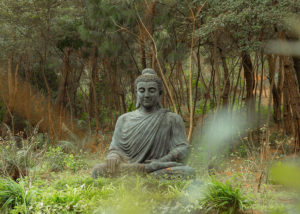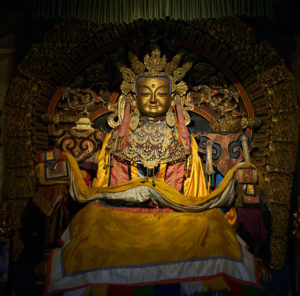Far East
Let's embrace the wisdom from Asia with its profound insights into suffering, transience, mindfulness and happiness.
Attitude towards Suffering
Asia has given us answers about the causes of suffering and how to achieve lasting happiness in life. Its definition of suffering is quite profound and not necessarily just what we mean by this term in everyday's speech. In this context, suffering should rather be understood as overall personal dissatisfaction. Let's get to the bottom of its cause.
Basic emotional life is characterised by the play of opposites between pleasure and pain, likes and dislikes, love and hatred. At the primitive stage of human development we are defined by our egoistic impulses which pertain to bodily pleasures. As a result of this condition inner suffering always accompanies us to a certain degree because external pleasures are transient. That's why the pursuit of material objects and materialistic comfort ultimately leads to dead end. This in turn results in disappointment and personal crisis.

Our life path is lined with personal sorrows. It doesn't have to be this way.
Furthermore, as we crave for the external world, whenever the cravings take control over us, we loose self-command. This excess of desires brings pain too, because the lack of inhibition destroys our inner equilibrium and balance needs to be restored. In the process of rebalancing we experience pain and discontent.
All human life is to a certain degree defined by this constant, inner discomfort. However, there’s a way to conquer and transcend personal suffering. In fact, overcoming suffering is the path to a fulfilling life and Asia offers an explanation on how to achieve this noble goal.
Overcoming desire
Human nature at the primitive stage is determined by desire for selfish, pleasant experiences. Pain and suffering follow each excess of unrestrained passions. It’s the cycle of pleasure and pain which characterises a low emotional life. Desire is insatiable and always takes you back to the cravings and you become a slave to your passions. It’s a mechanical, endless cycle from which we should grow out as we mature with age. The pursuit of pleasure and the constant submission to one’s unchecked desires eventually leads to inner emptiness, dissatisfaction, disappointment and eventually psychological suffering.

Happiness resides in peaceful tranquility.
Human development implies growing out of this vicious cycle of pleasure and displeasure by transcending personal desires. By cultivating mental ideals we ennoble our feelings and in the process become less self-oriented in thought, speech and action. We become less selfish and act more selflessly. Our own self loses its importance and we orient ourselves towards other people. In this way we renounce selfish personal desires and achieve gradual liberation from the primitive cycle of egoistic pleasure and suffering.
Renunciation & Liberation
The meaning of life is the liberation from selfish suffering by overcoming our primitive desires and ennobling our character. To achieve this state of a peaceful mind we shouldn’t care about the results of our good actions. We shouldn’t care about rewards for being a good person. We should be happy to think, speak and act out of pure compassion and according to rational motives, not because we expect recognition or pleasant experiences from good behaviour.
Renouncing the results of our good actions sets us free from expectations and as a consequence from psychological desires and personal attachment. In such a state of the mind inner dissatisfaction and suffering cease to exist, because we become completely unselfish. Our primitive emotional impulses cannot rule over us any more and the mind becomes peaceful like still water.

Still the waters of desire by calming down your mind.
Noble eightfold path
What is the way to achieve that liberation from desires and the cycle of suffering? As in all cultures the path to lasting harmony and happiness is based on ethical behaviour and self-control. Compassion and non-attachment can be trained and for that there's a method which is the middle way between the extremes.
It’s the way of righteous behaviour in thought, speech and action which can be summed up in 8 ethical actions: right view, right resolve, right speech, right conduct, right livelihood, right effort, right mindfulness, and right meditative contemplation. You can study these 8 practices in your pursuit of conquering suffering to achieve lasting happiness in life.

True happiness can be achieved through ethical life as summed up in the Noble Eightfold Path.
1. Right view: our actions and beliefs have consequences and we need to recognise the importance of living an ethical, righteous, responsible and compassionate life.
2. Right resolve: we peacefully renounce the things that don't matter in life, and start practising sensual restraint, non-ill-will (no cruelty), loving kindness and compassion. Such a mindset helps contemplate impermanence, the nature of suffering and unselfishness.
3. Right speech: no lying, no rude speech, no telling one person what another says about him/her to cause discord or harm their relationship (no gossip).
4. Right conduct: no killing or injuring, no taking what is not given, no sexual misconduct, no materialistic desires.
5. Right livelihood (job, employment): no trading in weapons, living beings, poisons etc.
6. Right effort: we should guard our senses and sensual capabilities. Instead of distraction by the external world we should strive to prevail in wholesome states of the mind, which basically means self-control.
7. Right mindfulness: never be absent minded. Be conscious of what you're doing. Become aware of the impermanence of body, feelings and mind and observe how your thoughts and perception operate. Train your attention and keep a soft focus on your consciousness expressions.
8. Right meditative contemplation: this meditation practice is probably too technical for an average person. If you managed to exercise the previous 7 precepts, then you're doing very well, indeed. This one is about achieving states of insight through meditation, one-pointedness of the mind, mindfulness and much more. It should be enough to train in simple meditation by focusing on ethical qualities that you'd like to develop in your mind.
Selflessness & Bliss
By ennobling our whole character and through the righteous mind and action we liberate ourselves from selfishness and egoism. We become truly self-less. Our personal self stops having any importance and we live mostly for other people. The personal self becomes irrelevant to us. In a certain way the self becomes annihilated. Yet, we enter into an even fuller life, because we renounced selfishness which was our personal desires and primitive passions. Once our ego is conquered, we feel more alive and happier than ever before.
Thank you, Asia, for teaching us the lesson of selflessness, mindfulness and meaningfulness.

Achieve the light of knowledge and freedom from all suffering.



